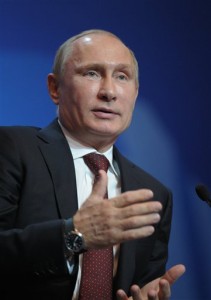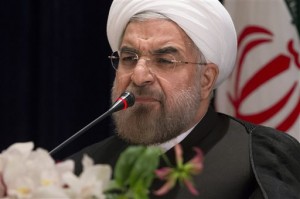
(AP photo)
World leaders have recently used opinion-editorial sections of American newspapers to set forth their political agendas — a move that disrupts conventional methods of international communication.
Russian president Vladimir Putin published an article that expressed his concerns over possible American unilateralism — acting outside the cooperation of other countries — in the New York Times editorial Sept. 11. Sen. John McCain of Arizona quaintly responded by also publishing an editorial in Russian newspaper Pravda on Sept. 19. Iranian president Hassan Rouhani followed suit by publishing his own editorial in the Washington Post on the same day as McCain.
The success of these editorials is difficult to determine, and some are skeptical that this style of international communication will become common practice.
“I don’t expect it to be a trend,” said Richard Davis, a professor of political science. “It doesn’t change minds. In fact, if anything, it likely hardens them if the op-eds include criticism.”
Davis pointed out that Putin’s editorial is an example of such criticism.
“Recent events surrounding Syria have prompted me to speak directly to the American people and their political leaders,” Putin said. At the time of its publication, President Barack Obama was still seriously considering a military strike on Syria, which Russia entirely opposed. One heavily critiqued statement in the op-ed included his attack on American “exceptionalism,” using Obama’s own use of the word — albeit in a different context — against him.

(AP photo)
Putin attempted mostly to appeal to American sentiment during the Syria crisis. “It’s an attempt to bring the domestic politics into some sort of international debate,” said Celeste Beesley, BYU professor of international relations. Beesley said Putin’s editorial not only engaged the American public but also sent a message to the American government.
“Who makes a decision about what’s going on in Syria?” Beesley asked rhetorically. “It’s not going to be put to a referendum. He (Putin) is exerting pressure on the people who will be making that decision by appealing to the American voters.”
McCain’s editorial — titled “Russians deserve better than Putin” — took a slightly different approach. McCain appealed to the Russians by heavily attacking the Russian government, saying, “They don’t respect your dignity” and that Putin rules “by corruption, repression, and violence.” McCain’s arguments deeply reflect the idea that a good defense is a strong offense.
Rouhani, the newly elected president of Iran, took a surprising approach on international cooperation that defied the expectations set for him by his predecessor, Mahmoud Ahmadinejad. Rouhani reiterated his “pledge to engage in constructive interaction with the world,” whereas Ahmadinejad was viewed by many as a ruler who only went his own way.

(AP photo)
The world’s excitement about a new, interactive and cooperative Iran was slightly drained when Rouhani spoke to the United Nations General Assembly. Rouhani still supports Iran’s nuclear enrichment program, saying it would only be used for “peaceful purposes.” He also maintained the Iranian position toward liberating the Palestinians.
Some politicians have urged Obama not to engage in such “constructive interaction” with Iran because of Rouhani’s opinion of Israel. Sen. Ted Cruz of Texas introduced a resolution on Sept. 24 which, if agreed upon by the Senate, expresses the desire for Obama to avoid any meetings with Rouhani until the government of Iran “affirms the right of Israel to exist as a Jewish state.”




